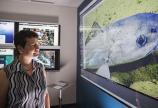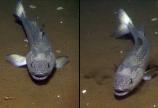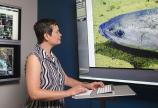Citizen scientists are the future for our oceans
- Jody Paterson

The impressive performance of more than 500 “citizen scientists” who signed on for a study counting deepwater sablefish off the Tofino coast is heartening proof that understanding our oceans is something we can all be part of, says one of the Ocean Networks Canada (ONC) scientists who co-authored the study.
That’s a key takeaway for World Oceans Day on June 8, notes scientist Maia Hoeberechts, ONC associate director of user services.
“This study is all about who can help science,” she says. “The theme for World Oceans Day this year is ‘Our Oceans, Our Future,’ which is all about building interest and ability for individuals to make a difference whether within their own circles, in the community or at the global level.”
Citizens scientists ensure all videos are seen
ONC is a University of Victoria initiative that has operated ocean observatories in the waters around Vancouver Island for a decade. Observations in the Arctic began five years ago, and more recently along the British Columbia coast from Tofino to Prince Rupert.
Since its earliest days, ONC has counted on citizen scientists from around the world to help monitor and comment on the real-time camera feeds from the observatories posted on its website. With 90,000 hours of archived data generated to date, the participation of citizen scientists is essential to ensure more of that video data gets seen.
The fish-counting study asked volunteers to view deep-sea video samples from the observatory in Barkley Canyon and estimate numbers of sablefish, also known as black cod.
The objective was to test how amateur scientists performed in comparison to the counts of an expert biologist, a class of undergraduate students and a computer algorithm monitoring the same video segments.
All the human observers proved better at fish-counting than the algorithm. Those who had some training did almost as well as the biologist.
Knowing that citizen scientists can be called upon to help experts analyze vast amounts of data generated by the observatories offers tremendous potential to increase the network’s vital impact, enrich human understanding, improve commercial fisheries management and protect life under the sea, says Hoeberechts.
“We need to move beyond the view that an expert is the only person who can analyze the data we’re collecting,” she says. “It’s not new that citizens make scientifically useful observations, it’s new that science is taking them seriously.”
Humans are better observers
Science has been relying on citizen scientists for at least 1,167 years, which is when residents of Japan began their ongoing annual notation of the first spring day when blossoms were spotted on the country’s flowering cherry trees. That record has now become an important confirmation of global warming, revealing a consistent pattern of earlier and earlier blossoming ever since the Industrial Revolution in the mid-1800s.
In terms of citizens helping with data analysis, the sablefish study confirmed that “humans are expert observers,” says Hoeberechts. When they put their observational talents to work analyzing deep-sea videos and still-photo imagery, they contribute to scientific knowledge of a vast part of Earth that’s still very much an unknown. More than 70 per cent of the planet lies beneath the world’s oceans.
The Digital Fishers program was developed jointly by ONC and UVic’s Centre for Global Studies to crowd-source citizen scientists. More than 1,000 amateur scientists from around the world now monitor the network’s live video feeds and participate in studies like the sablefish count. Watch for a new Digital Fishers campaign this fall.
Wiring the Abyss 2017
Those ready to test the waters without getting wet can jump in June 7-26 at oceannetworks.ca to be part of “Expedition 2017: Wiring The Abyss.” Real-time camera feeds in that period will feature underwater robots hard at work maintaining and expanding ONC’s West Coast observatories, while scientists on board the exploration vessel Nautilus talk about what they’re seeing. Follow #ONCabyss for more.



